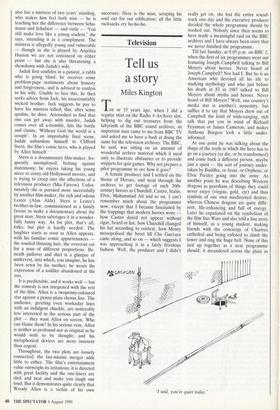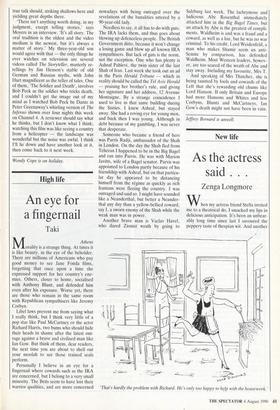Television
Tell us a story
Miles Kington
en or 15 years ago, when I did a regular stint on the Radio 4 Archives slot, helping to dig out treasures from the labyrinth of the BBC sound archives, an important man came to me from BBC TV and asked me to have a bash at doing the same for the television archives. The BBC, he said, was sitting on an amount of wonderful archive material which it used only to illustrate obituaries or to provide snippets for quiz games. Why not prepare a pilot programme to see how it goes?
A female producer and I settled on the theme of Heroes, and went through the archives to get footage of such 20th- century heroes as Churchill, Castro, Stalin, Elvis, Muhammad Ali and so on. I can't remember much about the programme now, except that I became fascinated by the trappings that modern heroes wore — how Castro dared not appear without cigar, beard or hat, how Churchill changed his hat according to context, how Monty monopolised the beret till Che Guevara came along, and so on — which suggests I was approaching it in a fairly frivolous fashion. Well, the producer and I didn't really get on, she lost the entire sound- track one day and the executive producer decided the whole programme should be washed out. Nobody since then seems to have made a meaningful raid on the BBC archives and I have always been sorry that we never finished the programme.
Till last Sunday, at 9.05 p.m. on BBC 2, when the first of six programmes went out featuring Joseph Campbell talking to Bill Moyers about heroes. Never heard of Joseph Campbell? Nor had I. But he is an American who devoted all his life to studying mythology and who just before his death at 83 in 1987 talked to Bill Moyers about myths and heroes. Never heard of Bill Moyers? Well, one country's media star is another's nonentity, but suffice it to say that Moyers drew out of Campbell the kind of wide-ranging, rich talk that put you in mind of Richard Feynman or James Cameron, and makes Anthony Burgess look a little under- informed.
At one point he was talking about the shape of the myth in which the hero has to go on a journey (or die, or be transformed) and come back a different person, maybe just a spirit — the sort of journey under- taken by Buddha, or Jesus, or Orpheus, or Elvis Presley going into the army. At another point he was describing Western dragons as guardians of things they could never enjoy (virgins, gold, etc) and thus symbols of our own misdirected desires, whereas Chinese dragons are quite diffe- rent, life-enhancing and full of energy. Later he expatiated on the symbolism of the film Star Wars and also told a fine story of himself, as a young student, making friends with the concierge of Chartres cathedral and being enlisted to climb the tower and ring the huge bell. None of this tied up together as a neat programme should; it meandered across the plain as 'I said, you're quiet today.' true talk should, striking shallows here and yielding great depths there.
'There isn't anything worth doing, in my judgment, except telling stories,' says Moyers in an interview, it's all story. The oral tradition is the oldest and the video medium is the newest, but it's always a matter of story.' My three-year-old son would agree with that — the only things he ever watches on television are several videos called The Storyteller, masterly re- tellings by Jim Henson's stable of old German and Russian myths, with John Hurt magnificent as the teller of tales. One of them, 'The Soldier and Death', involves Bob Peck as the soldier who tricks death, and I couldn't get the image out of my mind as I watched Bob Peck be Dante in Peter Greenaway's whirling version of The Inferno shown over four nights this week on Channel 4. A reviewer should say what he thinks, but I don't know what I think; watching this film was like seeing a country from a helicopter — the landscape was wonderful but the noise was awful. I think I'll lie down and have another look at it, then come back to it next week.

















































 Previous page
Previous page